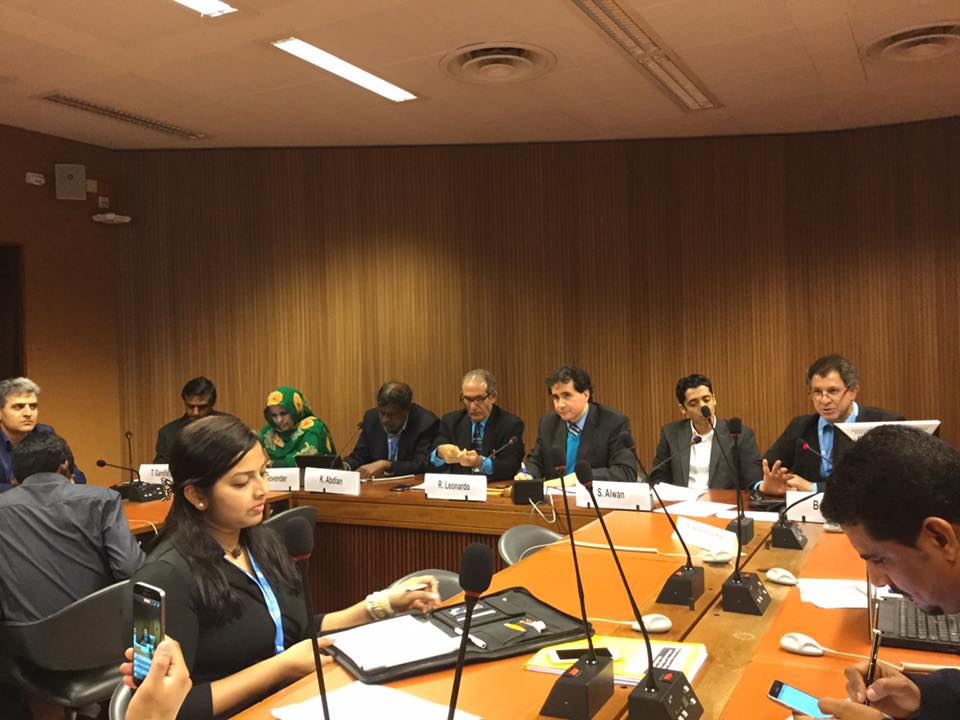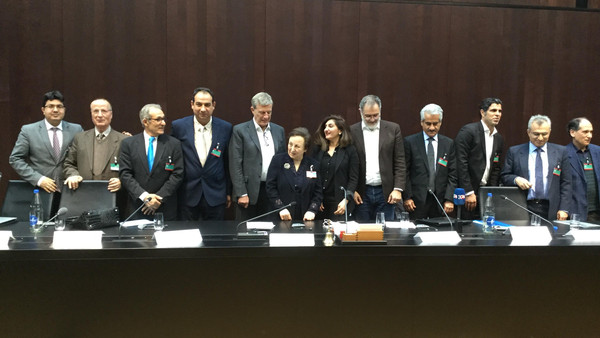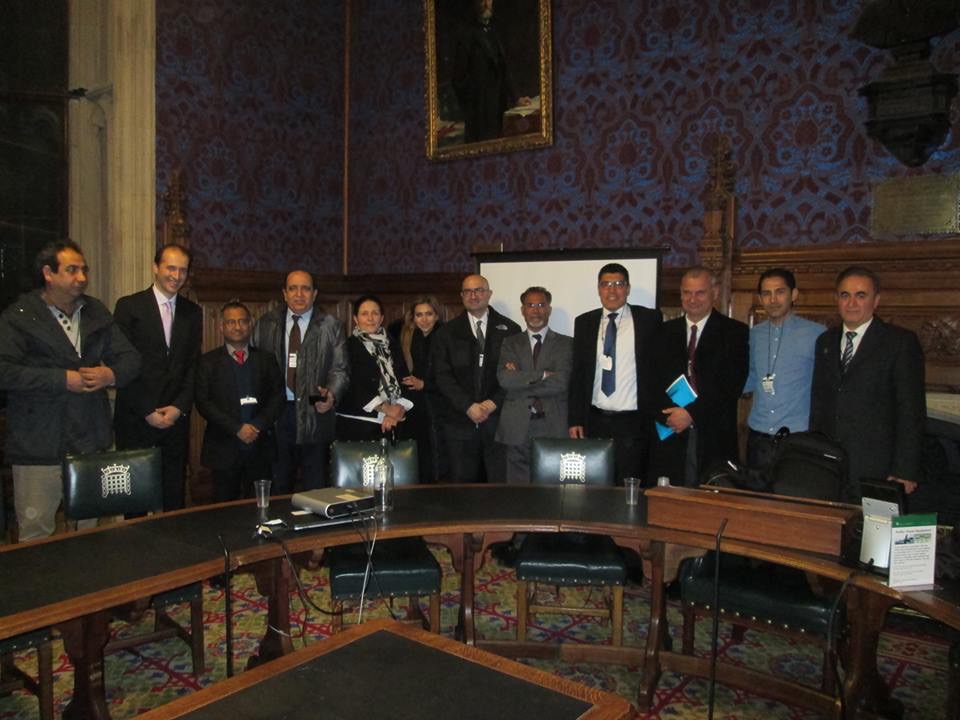Ahwazi Arabs and Kurds Call for self-determination in UN
On March 10th , Concurrent with 34th session of the Human Rights Council in Geneva , a side event titled" self determination and autonomy :the implementation of the right of self determination as a contribution to conflict prevention “ was organised by Association Solidarite International Afrique in partnership with Association Bhaarathi Centre Culturel Franco-Tamoul, Association Des Etudiants Tamoules de France , and Swiss council of Eelam Tamils .
The description of the side event reads : “The Universal Declaration of human Rights , reflect upon the progress which has been made in the field of human rights since the Declaration’s adaptation , on December 10, 1948 ,it emphasises the need to respect human rights so that people will not be forced in the last resort to seek recourse to rebellion against tyranny. Self-determination itself is a human right and a prerequisite to the full enjoyment of other human rights . The implementation of this right is often perceived by people as a means to free themselves from oppression and tyranny .Many of today’s armed conflicts are centred around claims for self-determination .”
The speakers included : Mr. Baban Eliassi ,Centre Zagros pour les Deroit de L’homme from Kurdistan-Iran
Mr.Karim Abdian , Ahwaz Human Rights Organisation -Arabistan -Iran
Mrs. Abdesalem Omeima, Women Rights activist -Occupied Western Sahara
Mr.Gandhi Thirumurugan ,Human Rights activist from Tamil Nadu -India
Mrs. Hend Omairan , Women Rights activist -South Yemen .
Below is the presentation of Dr. Karim Abdian, President of Ahwaz Human Rights Organisation.
A quick glance at the current crisis spots in the Middle East invariably shows that the causes lay in the disenfranchisement, marginalisation, oppression and exclusion of non-dominant nationalities. Its true in Syria, Iraq, Lebanon, Yemen, Turkey and certainly in Iran.
I believe a looming such crisis in the horizon is Iran - Iran is the most diverse country in the region. A multinational state that is comprised of six major nationalities including Arabs, Baluchis, Kurds, Persians, Turks, Turkmen and smaller groups of other ethnic/linguistic and tribal groups. No one ethnic group has a numerical majority.�Iran is also home to Sunnis, Christians, Jews, Bahis, Manadis and others. These ethnic and religious groups comprise at least 50 and by some estimates 2/3 of the population. Yet these groups have not been accorded equal citizenship – their ethnicity and/or their religion are not being officially acknowledged.
Its also believed that a 1/3 of the population is Sunni- yet constitutionally, Persian language is the sole official language, and –Jafari Shia is the official religion - all other are ignored, oppressed, negated or at best marginalised. An Iranian Shia and Fars/Persian is by default have been positioned in a great advantage and dominance.
Using Shia theology and Persian literature, history, language and the education, the system, strategically and deliberately, privileged one ethnic group over others, thus creating socio-economic inequality, exclusion and oppression thereby stifling any chance of democratic transformation.�Promoting aggressive nationalism in Iran often times manifest itself in anti-Arab racism, and particularly against Ahwazi-Arab nation.
Ahwazi-Arabs, residing mainly in the southwest of Iran, in the province of Khuzestan or as called by its indigenous name, eghlim Al-Ahwaz or Arabistan, are an ethnic, national and linguistic minority in Iran. They are caught between an unfortunate phenomenon; they are subjected to racism due to historical Persian-Arab animosity. Ahwazi-Arabs have been one of the excluded constituent nationalities and Socio-economically, among the most oppressed and rank at the bottom- estimated to be between 5-7 million or about 10% of the population. The regime changed the Arabic name to Persian one to deny their Arab identity. Ahwazi-Arab historical lands account for 90% of Iran’s oil GDP, yet they live in abject poverty
Let’s look at what the so-called international community, the UN, and the keepers of the “World Order” have to offer to these disenfranchised, marginalised, and oppressed peoples.
What is the crisis management or preventative tools and measures presented or promised?
Obviously the right of self-determination is one - In UN literature, right to self-determination is defined as the right of a particular group of people to freely determine and control their political, economic or socio-cultural destinies.
We clearly support the UN despite its ambiguities and shortcomings – but in the absence of our representation in the UN and in light of ethnic cleaning and socio-economic subjugation by repressive states that rule us, the solution for oppressed people is the right to self-determination–but how do peoples such as the Ahwazi Arabs make the UN to abide by its obligations and enforce this right?
Article 2 of the UN Resolution 1514 of1960 states that: “All peoples have the right to self-determination, by virtue of economic, social and cultural development”. In all subsequent UN and regional organizations’ resolutions and literature, the word “peoples” is repeated over and over as the supposed possessors, or receivers, of self-determination.
ALL UN covenants such as International Covenant on Economic, Social and Cultural Rights (ICESCR, the UN International Covenant on Civil and Political Rights (ICCPR) of 1966, the GA resolution of 1970, the Helsinki Final Act of 1975, and the charter of Organization for Security and Co-operation in Europe (OSCE) adopted in Paris 1994 all refer to People entitled to self-determination--without defining who constitute people, with sometimes vague or conflicting or even contradictory explanations and definitions. I guess this what they call “CREATIVE AMBIGUITY”
In a report by UN experts during the UN Conference in 1998 in Barcelona on the “Implementation of self-determination: as a contribution to conflict prevention”:
Presents two types of self-determination, internal self-determination and external self-determination. �By Internal self-determination they meant the right to decide the identity and the form of governing body by the whole population of a State and the right of a particular group within the State to participate in decision-making at the State level, and the right to exercise cultural, linguistic, religious or (territorial) political autonomy within the boundaries of the existing state. It says that, politically, internal self-determination can take the form of participatory democracy, federalism, confederation, local government, self-government within the existing state or any other arrangement that accord with the wishes of the people but compatible with the sovereignty and territorial integrity of the existing state.
External, or full elf-determination is described as the right to separate from the existing states of which the group concerned is a part of, and to set up a new independent state.
While seemingly there is a distinction between “people”, “minority” and “indigenous nation or people”.
The concept of self-determination is problematically rigid regarding shifting borders or session. Generally, the consent of the state to which a people belong is needed for secession. For example, the Arbitration Commission of the Peace Conference on Yugoslavia, states that: “It is well established that, whatever the circumstance, the right to self-determination must not involve changes to existing frontiers at the time of independence except where the states concerned agree otherwise”.
An exception for full self-determination would be flagrant/serious human rights violations., including persistent oppression, annihilation/targeted killings, domination, discrimination, marginalisation, and other grave injustices denied any meaningful exercise of its right to self-determination, excluded its representatives from decision especially in matters affecting the well-being and security of the people, suppressed their culture, religion, language and other attributes of the identity valued by the members.
As for the possibility of internal self-determination for non-dominant ethnic minorities and/or peoples and nations in Iran, the dominant nationality, Persian Iranians and the government reject such a concept, fearing that it would be the first step towards their country’s fragmentation. The Balkans wars are cited as an example of what would happen to Iran if its regional governments were given a measure of autonomy.
The notion that Iran would balkanize with the introduction of a federal democratic constitution is based on the supposition that Iran’s minorities are inherently disloyal. It is, in fact, a racist belief that ensures that the ambitions of regional-based ethnic minorities should be forever repressed to ensure the integrity of the Iranian state. This attitude is shared by significant sections of the Iranian opposition and the Islamic regime itself.
We believe that equality needs to be accompanied by the devolution of power and a fair redistribution of wealth generated by the abundant resources in their traditional lands.
For the Ahwazi Arabs, federalism and regional autonomy would enable them to control their own affairs, protect their land rights and exercise their cultural rights. In absence of such peaceful transformation, increased oppression and continued social and economic marginalisation of the Ahwazi Arabs will also generate the kind of extremist backlash seen elsewhere in the region.
So in conclusion, by implementation of internal self-determination, In Iran, or any other repressive multinational state, would mean an arrangement where a voluntary association of all national groups constituting Iran (or any state) in which they will have the opportunity to develop their respective cultures, languages, histories, economies and homelands, under an appropriate manifestation of sovereignty, federal, nonfederal with an equally suitable system of good governance that guarantees and respects the rights of self-determination, may be an interim solution for peace and stability until and within a reasonable period where civil societies can evolve and develop to facilitate the international community to embark upon and guarantee a fair and a transparent referendum for these nations, nationalities or peoples.
- Details
- News











